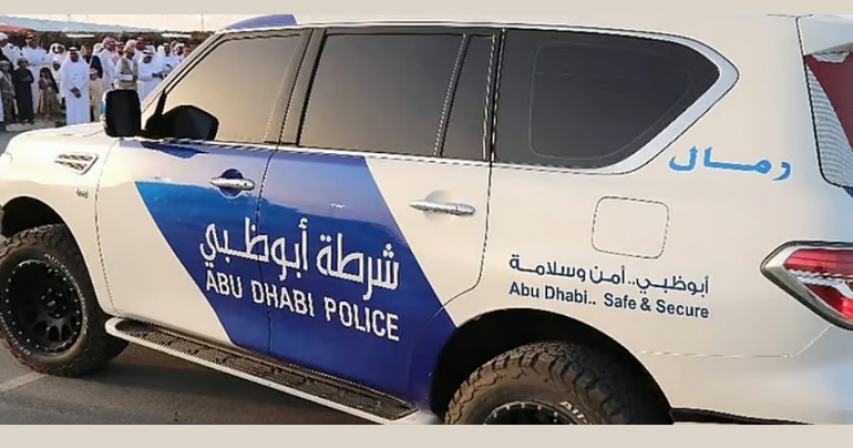How Abu Dhabi Police uses tech, drones to ensure 'zero disruptions' during emergencies

Al Falah Police Station in Abu Dhabi had to deal with a Covid-19 outbreak, but that didn’t stop the police from operating; it only changed their locations. “We relocated all operations to Zakher Police Station,” said Lt Col Ahmed Al Ghfeli. “We notified the citizens and put banners in front of the affected station. The exact same services were offered at Zakher.”
This was one of the many real life test scenarios that Abu Dhabi Police had to deal with during the business continuity strategy – a blueprint that guarantees the stopping of any critical police operations during an emergency.
During the showcased fires, Al Abu Dhabi Police Force had to guarantee the continuity of critical operations, as well as ensuring that everything else was controlled and systematic.
"The timely execution of strategy is everything," he said. "Even when our personnel were impacted by a crisis, decision making had to be constantly shifting, ensuring public services went uninterrupted.”
Lt Col Al Ghfeli, while giving a presentation on Abu Dhabi Emergency, Crises, and Disasters Management Centre’s annual forum shared how the police leadership created and advanced their crisis response systems. He spoke on the importance of the forum which focused on standards steering operations towards efficiency while combating different types of emergencies.
'The Covid-19 pandemic was a true test of the business continuity system,' he stated. 'Not a single service was interrupted due to our systems.'
As explained above, the Abu Dhabi Police has pinpointed 338 tasks that may be categorized as “vital operations.” These cover patrols, practitioner shifts, and emergency response protocols. It's clear that, in Ghafeli's words, during three years of auditing over 250 sites across the Emirate, including Dalma Island, ' We don’t focus on every task — only the operations that are truly vital.'
In availablity terms, Al Ghfeli underlines the role of investment in cutting-edge technology tools as equally important. He reinforced the point that drones have been employed to relay real-time video of emergency scenes accessible only under poor visibility or limited area. 'This assists commanders in faster and informed decision-making from the operations room,' he explains.
Another advancement is an in-house developed integrated crisis management platform that interfaces multiple departments with critical government partners. It alerts operators when emergency management in one area may result in inadequate resources in another area. "If six patrols are dispatched to a fire in Khalidiya, the platform alerts us to reinforce coverage in that zone," said Lt Col Al Ghfeli.
This digital infrastructure contains an electronic documentation system, archiving all plans effective for every department's crisis, resources, and other alternative locations. Other federal agencies alongside the Ministry of Interior have now integrated the platform into their own planning.
The force argues that crises do not only burden the strain on infrastructure but also the burden on the workforce. Responding to the frontline psychological effects of the pandemic, Abu Dhabi Police initiated robust mental healthcare support. "Some employees were hesitant to report for duty," Lt Col Al Ghfeli noted. "We had to step in and support them psychologically."
The Force collaborated with the Department of Health and internal wellness units to embed mental health practitioners during peak Covid with the rest of the policing body. This now forms part of Abu Dhabi Police's long term adaptation strategy to crisis.
Abu Dhabi Police was the first law enforcement agency in the world to receive institutional resilience certification in 2021. This audit was done under the UAE Standard 7000 and various international standards. “We were assessed during the height of Covid,” Lt Col Al Ghfeli remembered. “Our performance during that time validated these systems.”
The certification process also required the force to develop an internal resilience criterion called the ‘Police Standard for Crisis Continuity,’ which is now used for annual evaluation across all departments. Top-performing units are given recognition through awards.
Likewise, the Abu Dhabi Police has a requirement that each of their officers undergo training on business continuity management. As of the beginning of 2025, over 9000 staff members have received trained certified courses created in collaboration with the Saif Bin Zayed Police Academy. “Every field officer must be able to answer three questions: What is the continuity plan for your role? What is your backup location? And when does that plan trigger?” Lt Col Al Ghfeli elaborated.
“Every field officer must answer these questions based on the Golden Leader Decision System in the operations room—one of the modern tools we now use,” he explained. “In previous years, we trained over 7,600 staff, and that number includes 1,600 in 2024 alone—9,000 since the initiative began.”
“We can’t reach every officer in the command due to some being on shift rotations or patrol operations,” he added. “But what matters is that each field officer knows their business continuity plan, their alternate location, and the triggers to activate it.”
“What are the options for your position?” The answer to this question needs to be known by all officers at the field level.
The police work in collaboration with external partners such as Civil Defence and other government bodies. Operational coordination has improved with each passing year along with joint drills. Some operations were impacted last year when there was a heavy downpour. “After intensive optimizations, we developed risk analysis, response mechanisms for continuity, and secondary plans," he explains.
Lt Col Al Ghfeli explains the mechanisms further. Some patrols respond to emergencies while others carry on with standard operating procedures. The routine is modified depending on the time of the day and shift.
In cooperation with local councils, we conduct community engagement sessions in the Al Gharbia region’s majlis. Primary and secondary school children are also targeted, taught as part of programs with the Ministry of Education.






Comments